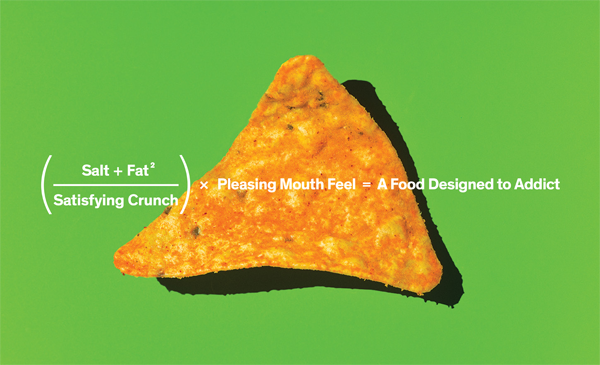In this editorial for the New York Times Magazine, Michael Moss discusses the “Extraordinary Science of Addictive Junk Food”. He begins the article, which derives from his current book “Salt Sugar Fat: How the Food Giants Hooked Us,” by describing a fateful afternoon when the CEOs from all the major corporations in the junk food industry gathered to be warned about their significant role in the American obesity epidemic. The article also features interviews with former and current junk food industry insiders, PR professionals and other experts who helped or continue to help create, market and sell the most addictive, cheap, and highly processed foods possible–all while making it appear to be healthy and fashionable through clever marketing and PR techniques. Among the brands examined by Moss are Dr. Pepper, Prego Sauces, Lunchables, and Doritos.
The basic story will be familiar to anyone who has followed the work of people like Michael Pollan or Marion Nestle. However, Moss’s article is still worth reading and helps to bring the message to yet a wider audience. Here are a few quotes from the article:
On the evening of April 8, 1999, a long line of Town Cars and taxis pulled up to the Minneapolis headquarters of Pillsbury and discharged 11 men who controlled America’s largest food companies. Nestlé was in attendance, as were Kraft and Nabisco, General Mills and Procter & Gamble, Coca-Cola and Mars. Rivals any other day, the C.E.O.’s and company presidents had come together for a rare, private meeting. On the agenda was one item: the emerging obesity epidemic and how to deal with it.
[…] Mudd then did the unthinkable. He drew a connection to the last thing in the world the C.E.O.’s wanted linked to their products: cigarettes. First came a quote from a Yale University professor of psychology and public health, Kelly Brownell, who was an especially vocal proponent of the view that the processed-food industry should be seen as a public health menace: “As a culture, we’ve become upset by the tobacco companies advertising to children, but we sit idly by while the food companies do the very same thing. And we could make a claim that the toll taken on the public health by a poor diet rivals that taken by tobacco.”
[…] “What can I say?” James Behnke told me years later. “It didn’t work. These guys weren’t as receptive as we thought they would be.” Behnke chose his words deliberately. He wanted to be fair. “Sanger was trying to say, ‘Look, we’re not going to screw around with the company jewels here and change the formulations because a bunch of guys in white coats are worried about obesity.’ ”
[…] The public and the food companies have known for decades now — or at the very least since this meeting — that sugary, salty, fatty foods are not good for us in the quantities that we consume them. So why are the diabetes and obesity and hypertension numbers still spiraling out of control? It’s not just a matter of poor willpower on the part of the consumer and a give-the-people-what-they-want attitude on the part of the food manufacturers. What I found, over four years of research and reporting, was a conscious effort—taking place in labs and marketing meetings and grocery-store aisles—to get people hooked on foods that are convenient and inexpensive. I talked to more than 300 people in or formerly employed by the processed-food industry, from scientists to marketers to C.E.O.’s. Some were willing whistle-blowers, while others spoke reluctantly when presented with some of the thousands of pages of secret memos that I obtained from inside the food industry’s operations. What follows is a series of small case studies of a handful of characters whose work then, and perspective now, sheds light on how the foods are created and sold to people who, while not powerless, are extremely vulnerable to the intensity of these companies’ industrial formulations and selling campaigns.
DemocracyNow! also picked up the issue and interviewed Michael Moss in one of their recent broadcasts.
And the following, related interview with Melanie Warner, author of “Pandora’s Lunchbox: How Processed Food Took Over the American Meal,” is also worth watching.


